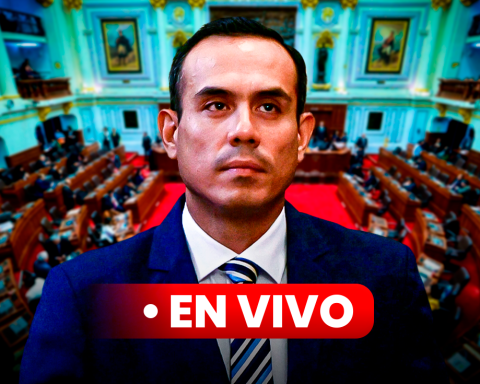
This Tuesday, February 22, the first televised debate was held – towards the March 27 referendum – between senators Oscar Andrade (Frente Amplio) in favor of the reform of 135 articles of the LUC, and Guido Manini Ríos (Open Council) for keep the LUC unchanged.
The debate was based on four thematic axes: “public security, housing, education and labor relations”.
Public security
Manini Ríos began the debate, saying that one of the main reasons why people voted for the coalition was because of the situation of “insecurity in the country.”
He added that the murder rate” in Uruguay placed the country only below Venezuela, Colombia and Brazil.
As long as work policies do not give results, society cannot be left defenseless, he indicated.
“For those who do not want to continue with their hearts in their mouths when a child or family member leaves their home, this Law protects them and guarantees the enjoyment of their rights. To the violent, to the delinquents, this Law tells them that the full weight of the Law is going to be applied to them, ”he sentenced. He assured that emphasis will be placed on the fight against drug trafficking and that the Police will be given the respect they deserve.
Manini Ríos stated that “ideologically” in the Broad Front governments it was assumed that “the criminal was the victim and society the victimizer”, he assured that the LUC articles related to security have the objective of “protecting society”.
For his part, Andrade stated that the Department of Criminal Law and Criminology unanimously “rejects the proposed changes, for example, in self-defense, which establishes that they give more hierarchy to an agricultural establishment than to the home, which according to the Constitution is an inviolable sacred.
The Frente Amplio parliamentarian expressed that it is allowed, for example, that “a boy who jumps a fence for a few blocks, and the theft is wrong, the answer may be homicide. You don’t have to be honest or dishonest to understand that this change is profoundly negative.”
Andrade cited that the Constitution of the Republic establishes in its article 15 that “no one can be imprisoned except in flagrante delicto, having semi-full proof of it or by written order of a competent judge.” Therefore, “it is not a reason to be arrested for forgetting your identity card.”
He assured that “this combination of greater operational capacity of the police and less accountability lends itself to abuse, impunity and violation of human rights.”
He added that to protect the Police “we must not give them expired vests, to protect the Police what we have to do is protect their salary.” On the other hand, he referred to “punitive inflation” and cited figures from the Parliamentary Commissioner for the prison system, according to which 80% of women who are imprisoned with their children or pregnant, 78% are imprisoned for the crime of commercialization. nonviolent drug. Four years establishes the LUC as the minimum sentence. This is done in a country where the minimum sentence for intentional homicide is two years.”
Manini noted that proportionality and progressiveness continue to be maintained in legitimate defense. He said that there have always been excesses with or without LUC and they have always been punished. But the easy trigger was not reached as said.
living place
Regarding housing, Andrade stated that with respect to rents, the LUC has amassed a set of initiatives that are all “fierce and even cruel to the family”, because “absolute discretion is used in the terms, at the end of the contract enables a fine of up to four and a half months the value of the lease if you take a day to deliver the house.
He questioned that the LUC “establishes a very short eviction period for the bad payer, which is the one that is only three days late, but also very short for the good payer.” Likewise, he referred to the fact that “arrears is usury”, because if someone is three days late, the increase is 60% on the fee. In addition, at the time of the eviction, against everything that would be the sensitivity of any average Uruguayan, the judge does not have the possibility of granting extensions for cases of force majeure outside of five or six days “
“If a family has to face eviction and it is a woman who is pregnant, who has small children, it is winter and she has nowhere to go, with the LUC rental proposal, she ends up outside”, she questioned.
In turn, Manini Ríos expressed that “the image of the pregnant woman and her five children can sensitize everyone, but it may also be that this pregnant woman is the owner of that home and that with the income she receives from the tenant who pays her, she can make ends meet”.
In addition, he indicated that “that pregnant woman may be looking for something to rent, without having a way to access a guarantee and this Law allows her to access housing.”
He criticized that there are more than 70,000 housing deficits, 650 settlements where almost 200,000 Uruguayans lived unworthily and no solution was found in the last 15 years despite having more money than ever. But the money was “squandered on the regasification plant, Ancap and Pluna.”
He stated that “there are about 53 thousand empty homes in the country that are not turned over to the rental market and that what the LUC is looking for is to encourage some of these homes to turn over to the rental market in order to lower prices.”
For his part, Andrade referred to the fact that any serious study on irregular settlements in Uruguay will find that the “explosion of irregular settlements, which went from 2,000 households to 50,000 households, is found in the period 1985-2005.”
Education
Regarding education, the first to speak was Manini who questioned the management of the Broad Front and the role of the unions. He assured that the will of former Frente Amplio presidents, Tabaré Vázquez and José Mujica, was “twisted by a union that believed itself to be the navel of the world, the center of the educational system and that left aside the true center of the system, which are the students.” .
He referred to the articles of the LUC linked to education referring to the change in governance which achieved better coordination, better enforcement and bureaucratic obstacles are avoided.
He reported that progress is being made towards the university degree of teachers and that more incidence was given to the Ministry of Education and Culture.
“It is really annoying that the strength of a union leadership that has taken over education in recent years and did not allow the changes that had to be made at the time could be affected,” said the legislator of Cabildo Abierto.
He pointed out that “unions are the main promoters of private education and the main brake on changes in Uruguayan education. The main obstacle to a change in education is the conservative and reactionary spirit of a certain union leadership”.
While Andrade assured that with the LUC “teacher representation is pulverized, and autonomy is violated, which is a principle that has nothing to do with the FA, because you have to go to José Varela.”
He rejected the removal of the vote from the teacher representatives in CODICEN and questioned the management of education by governments prior to the Broad Front, which were the real “stumbling block” in finding better educational results, and criticized “inequality and a meager budget.”
On the other hand, he said that he did not understand “the stigmatization of the union organization and the budget cut of over 60 million dollars that generated salary reduction, loss of scholarships and loss of budget for scientific research. With less participation, surely not, removing teachers from the Primary Councils, after 100 years, surely not”.
Labor relations and social security
Regarding labor relations, Andrade said that for the first time in the history of Uruguay “the right to strike is regulated and it is regulated without social dialogue in a context of pronounced decline in wages and pensions. It seems that for the government the problem is the worker when he organizes and there he alters one of the three pillars of the defense of labor law: collective bargaining, union and right to strike”. He warned about the proliferation of “strikebreakers”.
He assured that it is part of a mistaken philosophy that deteriorates more than 100 years of social and labor achievements.
He said that “any serious study will find that contribution evasion, non-payment of wages, non-compliance with safety, harassment, and child labor are not in places where there is strong unionization. Any study of the conflicts in Uruguay says that most of the conflicts arise from employer breaches”. Rights can never be an obstacle to development.
Manini stated that “regulating the right to strike is a constitutional mandate, but this is not the case with this Law, because the LUC “defends the rights of the “weakest, who in labor relations are the workers who cannot give themselves the luxury of losing their wages for forced adherence to a measure of force that they may not share.
“They are those who are subjected to arrogance when they want to work on a day of strike and are subjected to physical or psychological violence as we have seen time and time again. Article 392 of the LUC guarantees the right to strike for strikers, the right to work for workers and the right to property for employers”.
“They are all constitutional rights and the Constitution does not prioritize one over another. Guaranteeing constitutional rights has to be the obligation of every government and in this case it is a requirement of the ILO”, remarked Manini.
About the “picketing” that can sometimes lead to violence in the exercise of the strike, is what is not expressly authorized.
“Who compensates the wages of that worker who could not go to work against his will? Why do you have to suffer physical or psychological violence? Why does an entrepreneur have to suffer the breakdown of machinery or loss of raw material? Perhaps it bothers Andrade that there is freedom to choose, ”he questioned.
At the end of the debate, Andrade called for a Yes vote in defense of public education, housing, that information cannot be hidden from the Justice by a person or so that the colonization lands have to do with the population of the campaign. “We have to respond to a way of governing with a set of measures that promote greater inequality.”
While Manini said that it is a fair, necessary Law that defends the most fragile, because it provides more security. “It is a Law that did not generate any negative consequences. Yes precursors are resorting to fear, as they did with the pandemic.” He questioned the economic policies of Danilo Astori and Mario Bergara “astoribergarismo” that were “functional to the most powerful interests”.

















